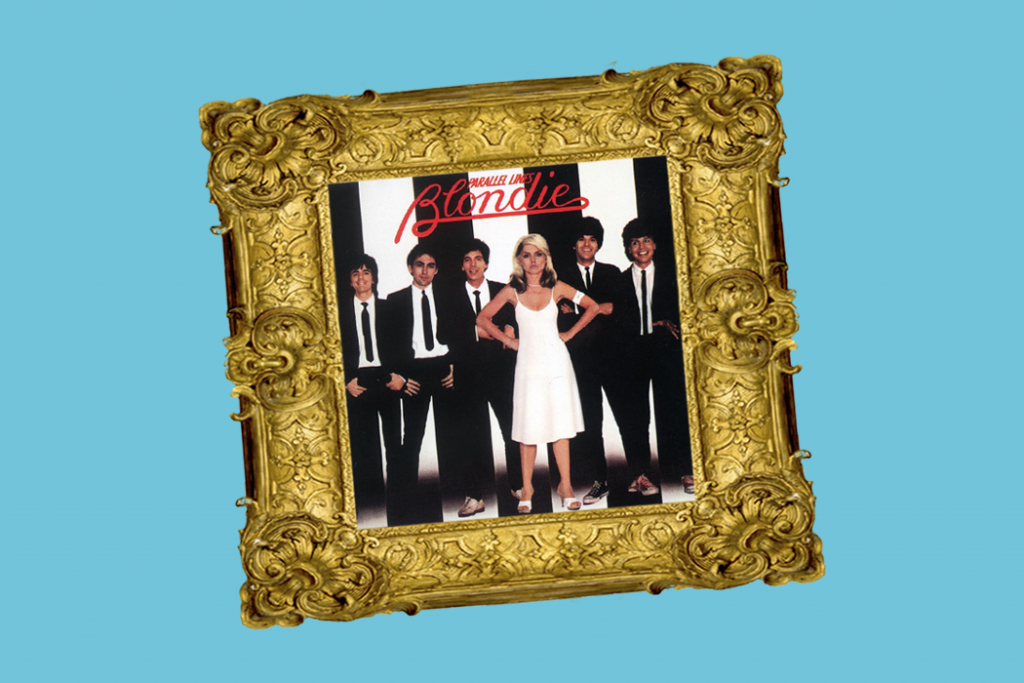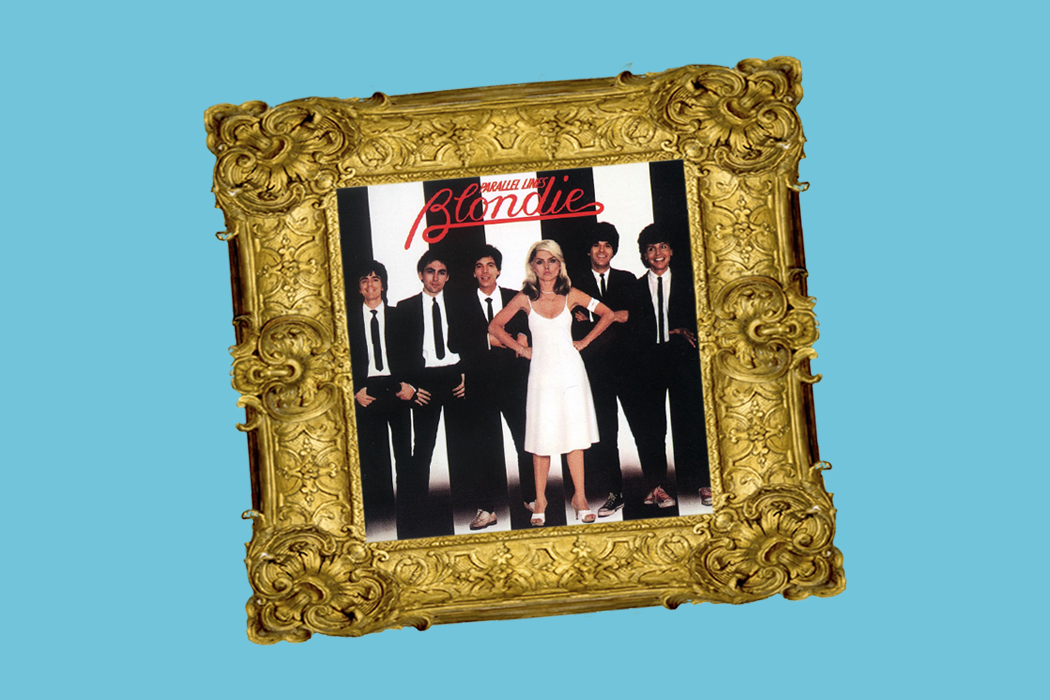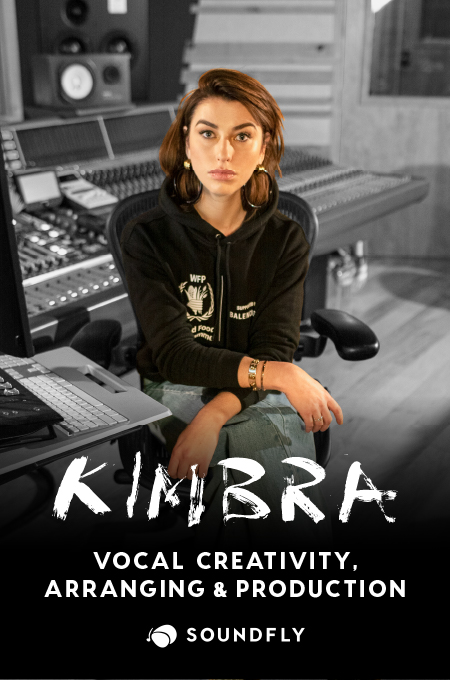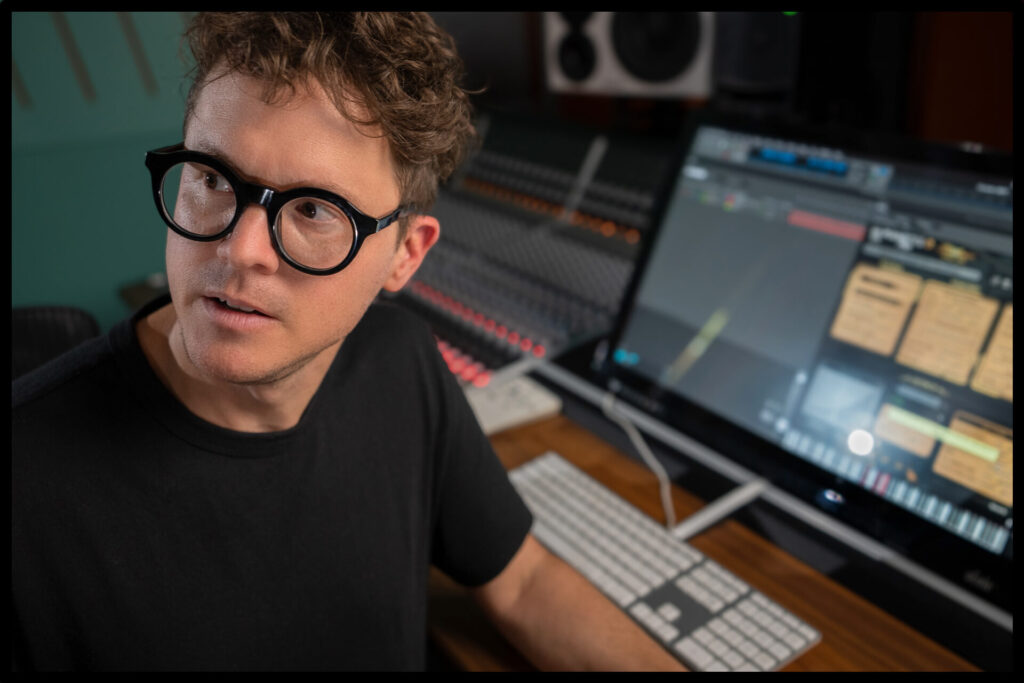Welcome back to our new series on Flypaper, Album Histories Monthly, which brings you the story of a single album each month, in the month that it was originally released. Last month, we covered New Order’s influential Substance 1987. This month:
Blondie – Parallel Lines
Release Date: September 23, 1978
“I remember how struck I was by Debbie and her presence and stuff, and you know… I can’t really remember the musicality of it that much.” – Chris Stein (guitar) regarding Debbie Harry’s first band the Stilettos.
Before founding Blondie with her then-boyfriend and musical collaborator Chris Stein, Debbie Harry spent time in New York City cutting her chops the way you’d expect a punk starlet would. She frequented downtown haunts with Andy Warhol and his gang of pop miscreants, and she was a beautician, a Playboy Bunny, and a barmaid at the infamous Max’s Kansas City, the rock bistro where she would eventually take the stage as one of their most influential headliners. And all this was before she founded the glam-rock girl band, the Stilettos.
The Stilettos weren’t the most talented, or the most exciting, band in New York City in the early 1970s, but the impression they made on the scene did provide a pivotal jumping off point for Harry. Chris Stein saw the band perform early on and was invited to play bass for them. He’d eventually go on to create Blondie with Harry after the Stilettos dissolved in 1974 and still plays guitar for the band to this day.
Blondie’s sound was built on driving, compulsive beats and spacey synthesizer keyboards, with Harry’s dreamy, almost uninflected, vocals drifting over it all. Stein and Harry found a rhythm section in drummer Clem Burke and bassist Gary Valentine, who knew one another from their New Jersey school days. With the addition of Jimmy Destri on keyboards, the original lineup was complete (James).
Blondie began playing at all sorts of Lower East Side venues and dives but eventually made CBGB their home. After gigging for about two years, they were discovered by Richard Gottehrer, eventual founder of the Orchard, an independent music and video distribution company.
Blondie’s first record, the single “X Offender,” backed with “In the Sun,” was co-produced by Gottehrer. It didn’t sell very well but provoked a lot of interest, at least enough to warrant a debut full-length album. “He was really instrumental in breaking us,” says Harry about Gottehrer. “We got a lot of airplay at a time when New Wave music was totally untouched, and a lot of it had to do with Richard’s name on the product” (James).
Blondie was an explosive live band with one of the most visually striking frontwomen of all time, but it wasn’t until they began to work on Parallel Lines that they really achieved pop perfection. Harry’s melodies were “frequently lugubrious” and “much too involved with a Warholian despair that took the form of nonstop deadpan cheekiness.” This cool demeanor was definitive of the New Wave sound to the core, and Clem Burke’s drumming was counted on to carry the band beyond mere art rock, but their early songs tended to miss that “jolt” of pop with really memorable hooks that Debbie Harry was obviously capable of delivering (Tucker).
“Parallel Lines really propelled us around the world.” – Debbie Harry (lead vocals)
Parallel Lines, on the other hand, is a perfect pop album. That isn’t purely my own opinion; the pantheon of rock critics in the last 40 years have used it as a benchmark, a high-water mark, of ’70s pop. The record somehow perfectly blends a punk-rock edge with hooky pop melodies. It’s 12 songs, or 39 minutes, of pure sonic bliss. It’s one of those lightning in a bottle records that leaves audiences scratching their heads asking, “How did this even happen?”
With Parallel Lines, the band drops the brooding artiness of its previous two records, Blondie (1976) and Plastic Letters (1978), and they start to develop themselves into a legitimately ambitious pop-rock group. Hooks and memorable melodies became very important to the band. Listen to “Hanging on the Telephone” or “Heart of Glass,” and you’ll be humming the choruses to those songs for weeks.
Creative differences led them to seek out a new alternative to their current label, Private Stock, and so they finally landed a deal with Chrysalis Records.

In addition to financial issues with the label, the band commented multiple times over the years that there simply “wasn’t enough cash.” They also had major issues with how the label handled their image, as evidenced by the release of the famous poster of Harry in a trashy-sexy, black-beaded, see-through top. “The group was afraid that it was being packaged behind an image of Debbie as a turn-on for dirty old men. Debbie detested the poster; the group was angry,” reported journalist Jamie James in 1979.
As a fashion trendsetter and sex-symbol, it was inevitable that writers would focus on her looks rather than her immense talent. Her wide, angular face with its innocent pout, which gave the air of both worldly glamor and naïveté, was a predictable template for fetishization. As far as their fans went, it was hard to tell if people were infatuated with Blondie’s music or with the looks of their lead singer.
During the lead up to recording and releasing Parallel Lines, however, Harry started to transform. She was no longer the sexy zombie, and she wouldn’t take any more abuse without displaying clear contempt for her abusers. It’s hard to say what the cause was, but she had just separated from her old label, she’d begun a relationship with band cofounder Chris Stein, and Mike Chapman was selected to produce their new record. Regardless of the reason, her newfound confidence as a fearless lead comes through in the music they laid down in that session.
Her gritty delivery of “I’m gonna getcha” (in “One Way or Another”) and the sardonic dismissal throughout “Just Go Away” are witty flourishes that, in the course of this exhilarating LP, have come to seem genuinely brave (James).
“I liked to stand in the middle of the room with them and conduct and sing and scream and jump up and down.” – Mike Chapman (producer)
Unfortunately, Parallel Lines also represents the apex of both Blondie’s and producer Mike Chapman’s respective careers. Chapman was brought in to buff out some of the rough edges and polish up Blondie’s sound. Chapman was familiar with glam, reggae, New Wave, and many other genres that made him a perfect fit to produce Blondie’s record. He’d produced and written songs for Sweet, Suzi Quatro, Mud, Pat Benatar, and the Knack. His credentials were long and, and he often worked with bands whose visual styles were synonymous with glam.
Manager Terry Ellis gave Chapman a very clear mission: turn Blondie’s songs into bonafide hits. “On Parallel Lines, I was given the responsibility by Terry Ellis to put this band at the top of the charts. He knew they could achieve that and I knew it, too, but I also knew that, given how they were when I began working with them, it might never happen” (Buskin).
This was the first record Chapman worked on without writing any of the songs. “I wasn’t being used as a songwriter, but as a song manipulator and song construction consultant/technician,” Chapman says, “there was a lot of stuff that needed to be put together, because as loose as the band were, their songs were even looser. Of course, being that I’d started out as someone who wasn’t really into albums but into writing singles, I had done a complete turnaround, and I was loving every minute of it” (Buskin).
Blondie’s biggest hurdle was their lack of technical proficiency. Even though Chapman loved their first two albums, he was brutally honest about their ability to play.
He described them as “musically the worst band I ever worked with.” He asserts that Frankie Infante was “the only great musician among them… He’s an amazing guitarist,” but Chapman was less than impressed with the others. “Jimmy Destri was a pretty good songwriter, but he wasn’t a great keyboard player. What he did, he did well, and I didn’t ever try to push him beyond that because I knew there wasn’t anything beyond that. Chris Stein was always so stoned, and although Clem Burke had all the right ideas, he had no sense of timing. I mean, he had a lot of ability, but I always felt he was trying too hard, and that’s what I used to tell him.”
Harry’s voice was surely beautiful — she had always been a “great vocal stylist with a beautifully identifiable voice” — but coaxing that voice out of her was the issue. Chapman continues:
“I love Debbie and I learned a lot from her about the psychology of recording vocals. Up until her I had been pretty barbaric in my approach to vocalists, like, ‘Get out there and sing!’ Once I encountered Debbie, I learned how to soft-shoe it a little more. The vocals I got out of her I really had to fight for psychologically, and when I listen to them now I remember those sessions very clearly. They were tough times, with a lot of tears, a lot of disappearing into the bathroom for hours. She’s a very emotional person and those songs meant a lot to her. When she was on — bang, it all happened really quickly. She’d never had to work hard in the recording studio prior to meeting me. She’d go in and do one pass and that was it.”
And it was amazing.

Despite the chaos and fragility, they had created a masterpiece. In Mike Chapman’s words, “That’s the magic of Parallel Lines. Every track is perfect from top to bottom… it’s hard to find a flaw in it, and there aren’t many records during your career that you can say that about.”
“Never again did singer Deborah Harry, mastermind Chris Stein, and their able four-man cohort nail the band’s signature paradoxes with such unfailing flair: lowbrow class, tender sarcasm, pop rock.” – Robert Christgau (journalist)
People in New York and beyond already loved Blondie, but Parallel Lines pushed them deep into the mainstream. Each of these 12 short, pungent tunes builds to its own little epiphany of pop, from girl-group sass (“Pretty Baby”) to Rolling Stones seediness (“Just Go Away”). On “Sunday Girl,” you sense the smile that Harry never exposes in her publicity shots, and the song is a triumph of saucer-eyed hard rock (Tucker).
The band also helped propel the beginnings of disco music by marrying robotic dance beats with a deluge of emotion and feeling. “Heart of Glass,” Blondie’s most popular song by far, is a true mating of Kraftwerk and Donna Summer. Harry embraces her steely aloofness and transcendence of romantic stereotypes to become a true feminist icon on her own terms. At its core, that’s what makes Parallel Lines so enduringly moving.
Rock critic Robert Christgau recently stated that, “Parallel Lines was a perfect album in 1978 and hasn’t gained a pound since — every song memorable, distinct, well-shaped and over before you get antsy.” The album endures, and if you’re not familiar with it, then I must implore you to check it out. It’s a masterpiece.
—
Bibliography
Buskin, Richard. “Blondie ‘Hanging On The Telephone’.” Blondie ‘Hanging On The Telephone’. Sound on Sound, 01 Sept. 2017. Web.
Christgau, Robert. “Robert Christgau: Blondie: Parallel Lines.” Robert Christgau: Dean of American Rock Critics. N.p., n.d. Web.
James, Jamie. “Platinum Blondie.” Rolling Stone. Rolling Stone, 28 June 1979. Web.
Michaels, Randolph. Flashbacks to Happiness. N.p.: n.p., 2005. Google Books. Web.
Tucker, Ken. “Parallel Lines.” Rolling Stone. Rolling Stone, 03 Nov. 1982. Web.





